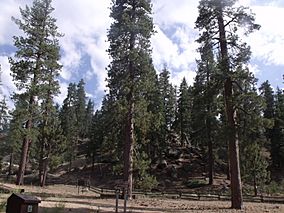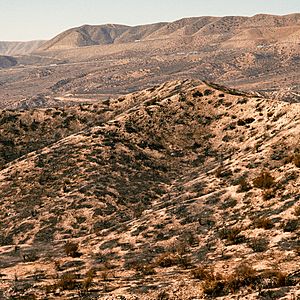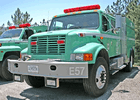San Bernardino National Forest facts for kids
Quick facts for kids San Bernardino National Forest |
|
|---|---|

Forest near Fawnskin
|
|
| Location | San Bernardino / Riverside counties, California, United States |
| Nearest city | San Bernardino, California |
| Area | 823,816 acres (3,333.87 km2) |
| Established | 1907 |
| Governing body | U.S. Forest Service |
| Website | San Bernardino National Forest |
The San Bernardino National Forest is a huge natural area in Southern California. It's a special place called a United States National Forest. It covers over 823,000 acres, which is like a really big park! Most of this land, about 677,000 acres, is owned by the government.
This forest is split into two main parts. One part includes the eastern San Gabriel Mountains and the San Bernardino Mountains. The other part has the San Jacinto Mountains and Santa Rosa Mountains. The land here goes from low areas at 2,000 feet to very high peaks at almost 11,500 feet.
Inside the forest, there are seven special "wilderness areas" where nature is kept wild and untouched. These include San Gorgonio and San Jacinto. The main office for the forest is in the city of San Bernardino. There are also smaller offices in places like Lytle Creek and Idyllwild.
Did you know that parts of some movies were filmed here? The 1936 movie Daniel Boone and the 1969 musical Paint Your Wagon both used the forest as a backdrop. You can even find free camping at 47 special "Yellow Post" campsites throughout the forest.
Contents
Exploring the Forest's Geography
The San Bernardino National Forest is made up of two large sections: a northern part and a southern part. These sections are shown on maps from the United States Geological Survey.
The western edge of the forest is next to the Angeles National Forest. This border runs north to south, about ten miles west of Interstate 15.
Northern Forest Area
The northern part of the forest is quite wide, stretching about 57 miles from east to west. It's about 24 miles from north to south. This section includes the San Bernardino Mountains. It reaches west of Mount San Antonio and the town of Wrightwood in San Bernardino County. The eastern side of this area goes about ten miles past Big Bear City. It also contains the San Gorgonio Wilderness, a very wild and beautiful place. The very southern edge of this northern section touches the Morongo Indian Reservation.
Southern Forest Area
The southern part of the forest is about 27 miles from north to south and 30 miles from east to west. Near its southern end, you'll find Toro Peak and the Santa Rosa Indian Reservation. To the north are Snow Creek Village and the Morongo Indian Reservation. A special area called Mount San Jacinto State Wilderness is located within this southern part. The town of Idyllwild is completely surrounded by the national forest lands.
While many national forests are known for their lumber, these two areas of the San Bernardino National Forest also have:
- Towns and vacation spots where people live and visit.
- Important Native American sites, like old caves and pictographs (rock paintings).
- The University of California-owned James Reserve research station, where scientists study nature.
The forest is also home to two of Southern California's tallest waterfalls: Big Falls and Bonita Falls.
Wilderness Areas: Nature's Untouched Spaces
Within the San Bernardino National Forest, there are seven official wilderness areas. These are part of the National Wilderness Preservation System, which protects wild lands. Some of these areas even stretch into the nearby Angeles National Forest or land managed by the Bureau of Land Management.
These wilderness areas include:
- Bighorn Mountain Wilderness
- Cahuilla Mountain Wilderness
- Cucamonga Wilderness
- San Gorgonio Wilderness
- San Jacinto Wilderness
- Santa Rosa Wilderness
- South Fork San Jacinto Wilderness
Remembering the Esperanza Fire
On October 26, 2006, a very serious event happened during the Esperanza Fire. Five brave firefighters from the San Bernardino National Forest's Engine 57 were working to control the fire. Sadly, a sudden and intense burst of fire quickly moved up a steep area. The firefighters were caught by the fire near Twin Pines, about four miles southwest of Cabazon, California. This tragic event happened in the San Jacinto Mountains. The Alandale fire station, where these firefighters worked, is near the community of Idyllwild.
Forest Firefighting Efforts
The San Bernardino National Forest plays a big role in fighting wildfires. As of 2001, there were eight Air Tactical Group Supervisors (ATGSs) working from the main office in San Bernardino. These are highly trained people who help guide aircraft during fires. They make sure that planes and helicopters drop water or fire retardant in the right places to help firefighters on the ground.

Amazing Forest Plants and Trees
The mountains in the San Bernardino National Forest are home to many different kinds of trees. Many of these are conifers, which are trees that have cones and needles, like pines.
You can find many types of pine trees here, such as:
Other conifer trees that grow well in this forest include:
- White fir
- Bigcone Douglas-fir (Pseudotsuga macrocarpa)
- Incense cedar
- Western juniper
Besides conifers, you'll also see other beautiful trees like:
The forest also has a lot of "old growth" areas, which means parts of the forest where trees have been growing for a very long time without being cut down. About 87,400 acres of the forest are old growth. The most common types of old-growth forests here are mixed conifer forests, white fir forests, Jeffrey pine forests, and lodgepole pine forests.
 | Selma Burke |
 | Pauline Powell Burns |
 | Frederick J. Brown |
 | Robert Blackburn |



